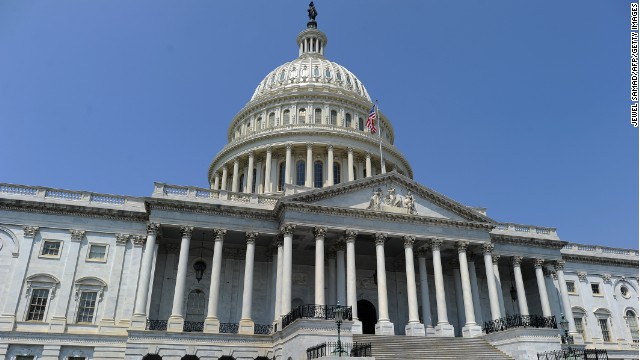 As
soon as President Barack Obama called on Congress to raise the minimum wage to
$9 an hour in his State of the Union address last week, you could see Speaker
John Boehner, seated behind the president, uttering his religious mantra:
"Job killer." And even if you couldn't read his lips, you could read
his mind: "Campaign contributions." He and his Republican colleagues
could expect huge donations from business lobby groups -- especially those that
depend on low-wage workers, like the hotel industry, restaurants and fast-food
chains, nursing homes and hospitals and big-box retailers -- to keep Congress
from embracing Obama's modest proposal.
As
soon as President Barack Obama called on Congress to raise the minimum wage to
$9 an hour in his State of the Union address last week, you could see Speaker
John Boehner, seated behind the president, uttering his religious mantra:
"Job killer." And even if you couldn't read his lips, you could read
his mind: "Campaign contributions." He and his Republican colleagues
could expect huge donations from business lobby groups -- especially those that
depend on low-wage workers, like the hotel industry, restaurants and fast-food
chains, nursing homes and hospitals and big-box retailers -- to keep Congress
from embracing Obama's modest proposal.
Boehner's
"job killer" grumble should come as no surprise. Business groups and
their political allies have been "crying wolf" about the minimum wage
ever since President Franklin D. Roosevelt proposed it during the Depression to
help stimulate the economy. The critics warned that enacting a minimum wage
would destroy employees' drive to work hard and would force many firms out of
business. The minimum wage law, warned the National Association of
Manufacturers (NAM) in 1937, "constitutes a step in the direction of
communism, bolshevism, fascism, and Nazism." Congressman Edward Cox, a
Georgia Democrat, said that the law "will destroy small industry."
These ideas, Cox claimed, "are the product of those whose thinking is
rooted in an alien philosophy and who are bent upon the destruction of our
whole constitutional system and the setting up of a Red Labor communistic
despotism upon the ruins of our Christian civilization." Roosevelt and
most members of Congress ignored these warnings and adopted the Fair Labor Standards
Act in 1938, establishing the federal minimum wage of 25 cents an hour.
Since
then, each time Congress has considered raising the minimum wage, business
groups and conservatives have repackaged the same arguments. In 1945, NAM
claimed that, "The proposed jump from an hourly minimum of 40 to 65 cents
at once, and 70 and 75 cents in the following years, is a reckless jolt to the
economic system. Living standards, instead of being improved, would fall --
probably to record lows." Instead, the next three decades saw the biggest
increased in living standards in the nation's history.
In 1975, economist Milton Friedman, a conservative
guru, said: "The consequences of minimum wage laws have been almost wholly
bad, to increase unemployment and to increase poverty. In my opinion there is
absolutely no positive objective achieved by minimum wages." While
campaigning for president, Ronald Reagan said, "The minimum wage has
caused more misery and unemployment than anything since the Great Depression."
In 2004, David Brandon, the CEO of Domino's Pizza, declared: "From our
perspective, raising the minimum wage is a job killer." Earlier this
month, Jason Riley, aWall
Street Journal editorial writer, called the minimum wage
a "proven job killer" on the newspaper's cable talk show.
Following Obama's State of the Union address,
business representatives and conservative media pundits echoed the same talking
points. Analyzing Obama's speech for Fox News, Nina Easton, an editor for Fortune magazine, repeated the claim that
increasing the minimum wage is a "job killer." Michael Saltsman,
research director at the business-backed Employment Policies Institute, told
Fox Business News that "minimum wage hikes lead to job losses." Bill
Herrle, executive director of the National Federation of Independent Business'
Florida affiliate, told Sunshine State News that
Obama's plan was a "job killer."
 U.S. Rep. Frank R. Wolf announced
Tuesday that he will not run for reelection in 2014, ending a distinctive
three-decade career in Congress and instantly making his bellwether Northern
Virginia seat a prime battleground in next year’s midterm elections.
U.S. Rep. Frank R. Wolf announced
Tuesday that he will not run for reelection in 2014, ending a distinctive
three-decade career in Congress and instantly making his bellwether Northern
Virginia seat a prime battleground in next year’s midterm elections.
 Congress declared a holiday truce in the budget wars Wednesday, sending President Obama a blueprint for funding the government through 2015. But the next skirmish was already on the horizon: an election-year fight over the national debt.
Congress declared a holiday truce in the budget wars Wednesday, sending President Obama a blueprint for funding the government through 2015. But the next skirmish was already on the horizon: an election-year fight over the national debt.



